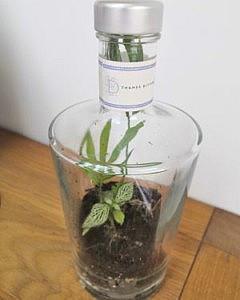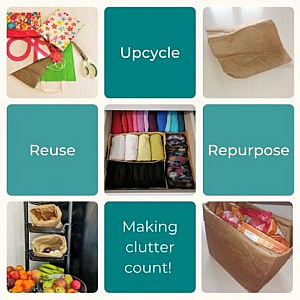Making clutter count: Decluttering during the pandemic
The pandemic has forced us to spend more time at home, with many of us eating, working, studying and relaxing in the same space for the past year. Lots of us have been working alongside school science experiments, created hand sanitizer stations and squeezed loo rolls into cupboards unusually full of extra pasta, flour and beans. Whatever pandemic living has looked like for you, the things and space around you have probably become much more noticeable and you may even have been inspired (or forced) to declutter your surroundings in order to live more comfortably indoors.Decluttering advice from the experts
We asked our APDO members what tips and advice they had for decluttering during a pandemic and how to get rid of the stuff you no longer need. Sue Spencer of A Life More Organised is a certified KonMari consultant and encourages people to understand first of all the reason they want to declutter and make a difference. "I know this isn't anything new, but it's always a useful reminder for people working on their own" says Sue. "Recognising your motivation and having a clear view of how you want your home to look and feel not only gives you the incentive to get going, but it also acts as a check back on whether to keep items. It provides useful incentive too if you get to a sticking point halfway through and it all feels a bit much". Carole Reed from HappySort acknowledges that, "it has been, and continues to be, difficult to declutter because charity shops are closed and most are not accepting donations".Where to donate your decluttered items
So, what can you do with your decluttered cast offs? Carole suggests that you earmark a box or bag in which to put items that are no longer needed. It will be easier to dispose of the item when the time comes if you have already removed it from your living space. This will help you keep on top of your clutter until charity shops re- open. Sue goes on to suggest that, if you are desperate to get the items out of your house, a number of charities are accepting postal donations. For example, many hospices are accepting donations online or at safe mobile sites which you can check out online. Shelter, Air Ambulance and British Heart Foundation are all accepting donations of clothing via post-in boxes up to 10 kilograms, measuring up to 60cm x 50cm x 50cm. Other organisations accepting donations by post include, Smalls for All, Re-Fashion.co.uk and Alzheimer's Society. And for further advice about donating, some of our APDO members have put together this post "10 ways to donate your decluttered items that you may not have thought of!" which is packed full of ideas and organisations where you can make your clutter count.Planning your decluttering
Amanda Terry from An Organised Youhttps://www.anorganisedyou.co.uk/ says "Ask yourself, 'If I don't have a use for something anymore, is there someone I know or a cause that will benefit from my decluttering as well as benefiting my own space and wellbeing?'". Like Amanda, Esme Fisher of Tidy Coaching suggests identifying charities or companies which are taking donations or selling items during the pandemic, and then specifically decluttering the items they are accepting. Esme also suggests that you set yourself manageable goals. "Declutter one category of items at a time, for example, clothing and make sure the items have left your home before you start on the next decluttering task. If you don't work in this methodical way, your donation bags will build up and become even more overwhelming than the clutter!"
Using social media
Facebook community groups have worked well for many. They are a way for local people to give things away during lockdown as they may otherwise not have been able to pass things on until shops reopen. Louise Simpson of Louise Simpson Coaching says. "Facebook community groups are a great way to find your local charities and you can start by putting up a post asking for details. Most charities have a Facebook page and often post details of the items they are most in need of, but they usually welcome a call to check too". Louise goes on to explain that, throughout the pandemic, her local women's refuge and homeless charities have needed donations more than ever as they have been faced with an increasing number of people needing their support. "You can help by donating lots of items, from food to clothing", she says. "They also need items such as furniture and kitchen items to help people get set up in new homes. You can help someone start over with the things taking up space in your home which you no longer have a use for. Due to infection controls they have even been asking for carrier bags to hand out items - no better excuse to clear out that growing stash in your cupboard and why not fill them with items to donate?" Mel Carruthers of More Organised agrees. As a Trustee for her local refugee action charity, Mel has seen the pandemic's effect on our decluttering from both sides, both as a professional organiser and as a charity volunteer. "Our depot has been closed throughout the pandemic", she explains. "But that hasn't stopped us being able to provide support where we can, usually by issuing requests for help through our social media pages. For example, last weekend we collected unwanted luggage and camping equipment to send to asylum seekers in London. When we heard of the acute need, we were able to tell our followers, ask them to declutter those items, and arrange for them to be safely dropped off at our depot". So keep an eye on your favourite charity's social media. Their shops may be closed, but their work continues, and they need your support at the moment more than ever. And they may be able to give you a solution for your decluttered items.Upcycling
If you can't find anywhere to take your donations, maybe you could turn your hand to an upcycling project. Stephanie Rough of The Organised Zone recommends reusing bottles to make a terrarium. She explains, "A lovely bottle of local gin from some friends now sits on the windowsill providing lots of lovely memories of our former home and, best of all, it's very low maintenance! If you are green fingered, you can create these yourself or find a producer such as Gin Garden". She adds, "Another popular idea is for you to fill empty bottles with string lights to add sparkle to any entertaining area inside or out". Anabel Morte Rodenas from Make Room With Anabel says, "If you are a bit like me and don't like to throw away bags, I've found a clever way to upcycle them, reducing clutter and improving organisation, win, win!! Use them as containers, for drawer organisation, for snacks, you name it. For paper bags, just cut them across - I use zig-zag scissors for a fun touch. You can also fold them to the right height. For the plastic ones, I find folding them gives them strength".
If these suggestions have sparked an interest in upcycling, APDO member Linda Cavallini interviewed interior designer and upcycling expert Lynne Lambourne for Spring Clearing Week recently in this post "Upcycling: Design that won't cost the earth".
Anabel Morte Rodenas from Make Room With Anabel says, "If you are a bit like me and don't like to throw away bags, I've found a clever way to upcycle them, reducing clutter and improving organisation, win, win!! Use them as containers, for drawer organisation, for snacks, you name it. For paper bags, just cut them across - I use zig-zag scissors for a fun touch. You can also fold them to the right height. For the plastic ones, I find folding them gives them strength".
If these suggestions have sparked an interest in upcycling, APDO member Linda Cavallini interviewed interior designer and upcycling expert Lynne Lambourne for Spring Clearing Week recently in this post "Upcycling: Design that won't cost the earth".

If you've decided to declutter during the pandemic but are stuck about what to do with your unwanted things, your local declutterer and organiser will be able to help. Check out the Find an Organiser database to find your nearest professional.
